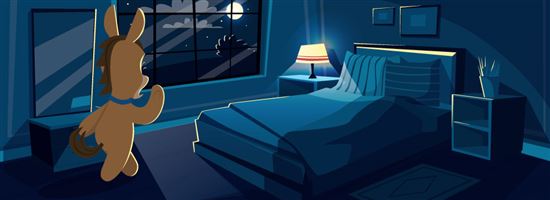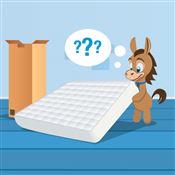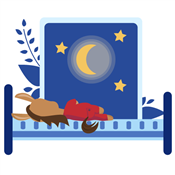Bedtime Calculator
What time should you go to bed? Use this free calculator to see your perfect bedtime and the number of hours needed at every age.
 |
Kids aren't the only ones who can benefit from sticking to a "bedtime."
Whether you're 16 or 60, getting a good night's rest is crucial. And a whopping one-third of Americans don't get enough sleep.[1]
So, what time should you go to bed? And how many hours is right for your age? Find out your ideal bedtime and sleep schedule with this calculator and guide to better sleep.
How do I find my perfect bed time?
You can find your perfect bedtime by thinking about two things:
- Your age: How old you are determines how much sleep you need. In general, younger kids and teens need more sleep (10+ hours). Adults and seniors need less (7-9 hours).
Refer to the chart further down to find your recommended number.
- When you want to wake up by: Consider what time you need to be awake. Be sure to account for any time you need to get ready for the day, as well.
To calculate your ideal bedtime, start at your desired wake-up time and count backwards by the number of hours you need.
For example, if you're 30, you need at least 7 hours of sleep. If you want to get up by 7 A.M., try to be asleep by 12 A.M. at the latest.
How many hours of sleep needed by age
The amount of sleep you need changes with age, with younger people generally needing more hours. Review the recommendations below to figure out how much shut-eye you should be getting.
| Age Group | Recommended Hours of Sleep Per Day |
|---|---|
| Newborn (0-3 months) | 14-17 hours[2][3] |
| Infant (4-12 months) | 12-16 hours per 24 hours (including naps)[3] |
| Toddler (1-2 years) | 12-14 hours per 24 hours (including naps)[3] |
| Preschool age (3-5 years) | 10-13 hours per 24 hours (including naps)[3] |
| School age (6-12 years) | 9-12 hours per 24 hours[3] |
| Teen (13-18 years) | 8-10 hours per 24 hours[3] |
| Adult (18-60 years) | 7 or more hours per night[4] |
| Older adults (61-64 years) | 7-9 hours[2] | Seniors (65+ years) | 7-8 hours[2] |
Why is it so important to get enough sleep?
Sleep is crucial for just about every part of your body to function properly. Not only will you wake up feeling refreshed after a good night's sleep, your overall health will be better in the long run.
Here are just a few things that can happen because of poor sleep quality or sleep deprivation:[5]
Short-term problems from poor sleep
- Less energy
- Drowsiness during the day
- Slower reaction time
- Irritability
- Impaired memory
- Impaired decision-making and problem-solving abilities
Long-term problems from poor sleep
- Impaired immune system
- Higher risk of weight-gain and obesity
- Higher risk of diabetes
- Higher risk of heart disease and other cardiovascular issues
- Higher risk of depression and anxiety
- Higher risk of hormonal abnormalities
How to get a better night's sleep
If you've been stuck in your sleep schedule for a while, you might feel like there's little you can do to change and improve it. But just a few simple adjustments can make a world of difference.
Here are a few things that can improve sleep quality:
- Try your best to wake up at the same time every day (yes, even weekends)!
- Avoid caffeine in the afternoon and evening.
- Turn down the temperature to create a cool sleeping environment.
- Try not looking at your phone, tablet, or other screens at least an hour before your bedtime.
- Create a relaxing bedtime routine so you're excited to wind down.
- Try to exert a good amount of energy during the day; even mild exercise will help you feel more tired at bedtime.
- Try to make your bedroom as dark as possible (a nightlight is okay if you need it).
- Consider using a white noise machine to drown out small noises in the night.
- Make your bedroom a relaxing place to be; cut down on clutter or treat yourself to new linens.
What are the sleep cycles?
You cycle through roughly four stages of sleep every night, and each one plays a part in giving you a good night's rest. Here's what each sleep stage consists of:
- Stage 1: Non-Rapid Eye Movement / "Dozing off"
This is the first several minutes of your bedtime as you try to "doze off". Your body hasn't fully relaxed at this stage, but there are small changes in brain activity. - Stage 2: Non-Rapid Eye Movement / "Light sleep"
At this stage, your muscles relax and your body temperature drops slightly. Eye movement also stops. Your brain shows small bursts of activity, which helps prevent you from waking up.People spend about half their sleep time in stage 2.
- Stage 3: Non-Rapid Eye Movement / "Deep sleep"
Your pulse and breathing slow down, and your brain starts to show deeply restorative delta wave patterns. This boosts your immune system, helps your memory, and contributes to insightful thinking. - Stage 4: Rapid Eye Movement / "REM sleep"
During REM sleep, your body experiences a temporary paralysis of the muscles, except for the eyes and muscles that control your breathing. REM sleep is vital to cognitive health.It's also when you have your most vivid dreams.
Bottom Line
Having a consistent, healthy sleep schedule is one of the best things you can do for your body and mind. It's true that everyone has late nights from time to time. But as long as you make an effort to get those hours in, your health will thank you for it.
With this calculator, there's no more guesswork when it comes to your bedtime. Just consider your age and your desired wake-up time and you'll be ready to hit the hay. Sleep tight!
References
- ^ "1 in 3 adults don't get enough sleep": CDC.gov, 2016.
- ^ "National Sleep Foundation's sleep time duration recommendations: methodology and results summary": National Library of Medicine, 2015.
- ^ "Recommended Amount of Sleep for Pediatric Populations: A Consensus Statement of the American Academy of Sleep Medicine": Journal of Clinical Sleep Medicine, 2016.
- ^ "Recommended Amount of Sleep for a Healthy Adult: A Joint Consensus Statement of the American Academy of Sleep Medicine and Sleep Research Society": Sleep Research Society, American Academy of Sleep Medicine, 2015.
- ^ "Sleep Disorders and Sleep Deprivation: An Unmet Public Health Problem": Institute of Medicine Committee on Sleep Medicine and Research, 2006.
Holly Zorbas is a assistant editor at CreditDonkey, a mattress comparison and reviews website. Write to Holly Zorbas at holly.zorbas@creditdonkey.com. Follow us on Twitter and Facebook for our latest posts.
|
|
|









